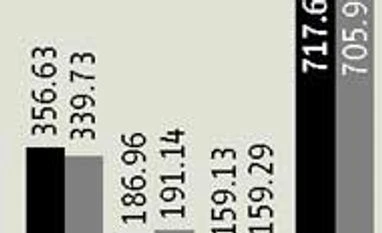It has been a muted year for the tea sector with weak crop, dwindling exports and, surprisingly, low prices. Producers are now looking up to the December and March quarters for the prices to go up, riding on winter demand.
Till August this year, the production in Assam was around 340 million kg compared to 357 million kg a year ago, while that in West Bengal was 191 million kg versus 187 million kg. Overall, north India has recorded a drop of 13 million kg. However, it hasn't quite reflected in prices.
The average auction price in the January-August period for north India was at Rs 136 a kg, compared to Rs 145 a kg last year. The main auction centres in the region that are indicative of a price trend are Kolkata and Guwahati. The average price for Kolkata is Rs 152 a kg against Rs 161 a kg last year, while for Guwahati it is Rs 137 a kg compared to Rs 145 a kg; Siliguri was worse at Rs 118 a kg compared to Rs 127 a kg. The all-India figure stood at Rs 118 a kg compared to Rs 126 a kg.
The only aberration is Darjeeling tea, where the average auction price till August was Rs 310 a kg, compared to Rs 301 a kg in the year-ago period.
Arijit Raha, secretary-general, Indian Tea Association, however, pointed out the quantity of offerings at the auctions had more or less held ground. The total quantity of offerings at the Kolkata auction centre was 74.5 million kg compared to 74 million kg last year, while Guwahati was at 69 million kg compared to 64.7 million kg.
Around 50 per cent of the crop is routed through auctions, while the rest is sold through private sales.
Export figures till August, too, were not very encouraging. Exports in the January-August period were at 125.9 million kg, compared to 129 million kg in the same period last year.
Producers, however, claim the shortfall in crop will reflect in prices in the October-March period. "The demand for tea is going up. Exports will also be higher than last year, which means that the carry-forward will be less than last year," said Aditya Khaitan, managing director, McLeod Russel India.
During January-September, McLeod Russel, the world's largest bulk tea producer, exported 20 per cent more than the same period a year ago.
A lower carry-forward means less tea in the system should reflect in a strong opening for the season next year. The all-India figure for October is higher at Rs 129.88 a kg, compared to Rs 126.59 a kg in the same period last year.
Till August this year, the production in Assam was around 340 million kg compared to 357 million kg a year ago, while that in West Bengal was 191 million kg versus 187 million kg. Overall, north India has recorded a drop of 13 million kg. However, it hasn't quite reflected in prices.
The average auction price in the January-August period for north India was at Rs 136 a kg, compared to Rs 145 a kg last year. The main auction centres in the region that are indicative of a price trend are Kolkata and Guwahati. The average price for Kolkata is Rs 152 a kg against Rs 161 a kg last year, while for Guwahati it is Rs 137 a kg compared to Rs 145 a kg; Siliguri was worse at Rs 118 a kg compared to Rs 127 a kg. The all-India figure stood at Rs 118 a kg compared to Rs 126 a kg.
The only aberration is Darjeeling tea, where the average auction price till August was Rs 310 a kg, compared to Rs 301 a kg in the year-ago period.
Arijit Raha, secretary-general, Indian Tea Association, however, pointed out the quantity of offerings at the auctions had more or less held ground. The total quantity of offerings at the Kolkata auction centre was 74.5 million kg compared to 74 million kg last year, while Guwahati was at 69 million kg compared to 64.7 million kg.
Around 50 per cent of the crop is routed through auctions, while the rest is sold through private sales.
Export figures till August, too, were not very encouraging. Exports in the January-August period were at 125.9 million kg, compared to 129 million kg in the same period last year.
Producers, however, claim the shortfall in crop will reflect in prices in the October-March period. "The demand for tea is going up. Exports will also be higher than last year, which means that the carry-forward will be less than last year," said Aditya Khaitan, managing director, McLeod Russel India.
During January-September, McLeod Russel, the world's largest bulk tea producer, exported 20 per cent more than the same period a year ago.
A lower carry-forward means less tea in the system should reflect in a strong opening for the season next year. The all-India figure for October is higher at Rs 129.88 a kg, compared to Rs 126.59 a kg in the same period last year.
)